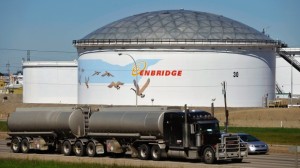Enbridge's Toxic Record is Keeping its Tar Sands Pipeline Permit Tied Up at State Department

A second Canadian pipeline company has its permit tied up in the State Department’s approval process. Enbridge, Canada’s largest pipeline company, is trying to expand its Alberta Clipper line, but is now facing delays.
Enbridge started up its first phase of the line, which has a capacity of 450,000 barrels per day (bpd), in 2009, after obtaining a U.S. federal permit from the State Department. Enbridge is now looking to expand its capacity, but the State Department says it needs to do further environmental analysis before granting Enbridge the go ahead to expand its Alberta to Wisconsin pipeline.
Enbridge is not looking to build another pipeline; rather, they are trying to increase capacity by 120,000 bpd for a total of 570,000 bpd. Beyond that, they would like to expand from 570,000 bpd to 800,000 bpd in the near future, which is almost as much tar sands oil as the proposed Keystone XL would carry.
“Obviously, things take longer in this environment that we’re in. I don’t think we want to draw any conclusions about the political environment. It’s not something that we can control. What we control is the fullness of our application,” CEO Al Monaco told reporters and analysts on a conference call to discuss the company’s fourth-quarter results, which included a net loss. “In this case, this is a fairly routine matter. The pipeline’s already in the ground, so we’re hoping that we move this along as quickly as possible.”
Another Canadian pipeline company, TransCanada, has been seeking U.S. approval of their Keystone XL pipeline since 2008. The Keystone XL would cut across the heartland of America bring up to 830,000 bpd of Canadian tar sands into the U.S. The Keystone XL has become highly politicized with many environmental groups lobbying and taking direct action against the pipeline.
Although Enbridge has managed to escape the same level of scrutiny as their competitor TransCanada, they have still faced opposition from activists in Canada and Michigan.
Enbridge is also the company behind the largest on-shore oil spill in U.S. history. Enbridge spilled more than one million gallons of diluted bitumen (dilbit, or tar sands oil) into Talmadge Creek in Marshall, MI, which then flowed 30 miles downstream into the Kalamazoo River in the late summer of 2010. Enbridge has spent nearly a billion dollars trying to clean up the spill over the last three years, but latest reports confirm that there is still oil in the Kalamazoo River.
Enbridge also owns several other tar sands pipelines aroung the country, including the Seaway pipeline system in Texas. Enbridge is currently expanding the Seaway pipeline system by the process of twinning. The new twin Seaway line will be a 30-inch diameter pipeline, and havea capacity of 450,000 bpd. Company officials are expecting a service date in 2014.